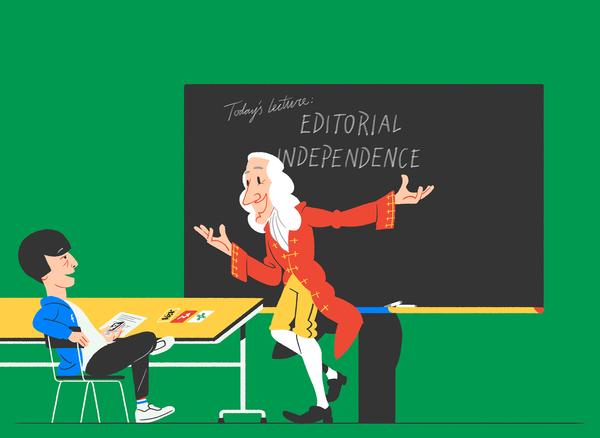27. mai 2015
The best times for journalism are yet to come

Why digital publishing will thrive off the healthy tension between technology and content. If you have nothing to tell us, but that on […]
Why digital publishing will thrive off the healthy tension between technology and content.
If you have nothing to tell us, but that on the banks of the Oxus and the Jaxartes, one barbarian has been succeeded by another barbarian, in what respect do you benefit the public?
VOLTAIRE
This is a rhetorical question. And a resounding denunciation of everything that is mundane. It was posed in 1764 by the French philosopher Voltaire.
Voltaire was concerned with the methods and style of story-writing: he believed that anyone who claimed to report on new and strange things should have in-depth knowledge and expertise, take his time and introduce the reader to the new culture, society and laws. And for that reason, Voltaire had no time for those mercenary writers who indiscriminately offered to produce stories for the booksellers of the Rue de St. Jacques in Paris – stories about Japan, Canada, the Canary Islands or whatever else happened to be in demand.
The principle that applied to philosophers and historians during Voltaire’s lifetime also applies to journalists. Voltaire was able to access the world of publishing through his love for good stories and his belief in the greater benefit of such works. Being independent, having an opinion and taking a stance were crucial to him.
“We don’t want to have editorial judgment over the content that’s in your feed. You’ve made your friends, you’ve connected to the pages that you want to connect to and you’re the best decider for the things that you care about.”
These words are representative of a new interpretation of digital journalism. They were spoken by Greg Marra, a 26-year-old Facebook manager who is responsible for the News Feed, which is probably the world’s most influential distributor of news nowadays. He suggests that the readers and users themselves decide what they see and do not see – and that a company like Facebook is simply a technology provider.
But these companies are more than mere providers. Facebook reports almost 1.4 billion monthly active users. Twitter has 288 million users, YouTube has 1 billion, Instagram has 300 million. According to a study by the Pew Research Center, 64 percent of Americans use Facebook, and a staggering 30 percent of American adults get their daily news via the social network.
News and stories are spread using algorithms, which are changed at irregular intervals at the discretion of programmers – programmers who do not give much thought to the significance of freedom of speech or democratic diversity of opinion. Often, they do not even realise what kind of social role and responsibility they have been given. They do not recognise their editorial power, a power that sometimes entails market domination. Today’s news organizations will have to find a way to bridge these two mindsets. Publishers cannot thrive without incorporating technology.
Does this mean that tech companies such as Google, Apple, Amazon, LinkedIn, Twitter or Facebook are becoming not only the new distributors of content, but also coming to control the process of sifting, weighting and evaluating events? Is it a good thing if editorial departments and distribution channels end up being controlled by a single entity? Or will the traditional publishing companies manage to uphold their journalistic genetic code as a competitive advantage against tech and infrastructure companies in the digital media economy?
Or maybe completely new protagonists, bloggers and aggregators – Buzzfeed, Vox, Vice, Global Voices – will become the major publishers of the digital world? In the tension between technology and content, stance and trust have probably never been as important as they are today. In a world in which content is increasingly becoming programmatic, responsible dissemination is becoming the publishing industry’s true competitive advantage.
Digitisation is the fourth great human achievement that has changed the face of civilisation, after the invention of language, writing and printing.
And this change is faster and more profound in the areas of the media that most affect civilisation and democracy, than anywhere else. Those who are critical of contemporary culture and insist on fighting digitisation – and those who see digitisation as heralding the downfall of the republic – are about as progressive as an Aborigine who believes that getting on a train means leaving his soul behind on the tracks.
The question, therefore, is not about the future of printed newspapers (one could have a heated argument on how long cost-cutting and economies of scale can generate satisfactory profits from print media, but that is not important). The decisive question is this: where does the future of journalism lie?
Firstly, staunchly defending paper as we know it today is a losing battle. It is also a pointless battle if it is not accompanied by a determined, adventurous attitude towards digital possibilities. Determination is not the same as copying printed texts onto the web and into apps. Determination means being on the front line of innovation.
I will admit that at Axel Springer we have a long way to go in this respect. Were we responsible for online journalism’s great content innovations? No. Were we at least first to adopt them from the innovators? No. Do we write code as elegantly as we write text? No. Have we held our software engineers in the same high esteem as our editors?
Not always, unfortunately. Do we give our people the resources and opportunities needed for them to think and act like entrepreneurs within the enterprise, or publishers within the publishing company? No. We are still not doing nearly enough.
In the first two decades of the internet, most publishing companies were careful not to rush it. They waited to see whether there was real money to be made with this ‘Internet thing’. That approach does not work anymore, since those who wait for all the necessary proof will find that others have long since cornered the market.
There will always be paper. It will just look a little different in the future. In just another decade the paper of the digital world, electronic paper, will probably look very similar to analogue paper. It will be thin, light, foldable, easy to roll up and available in different formats. It will not be made of pulp, but from plastic, and we will be able to reuse it for months – to watch videos, play computer games, write letters, chat in social communities and to read as many newspapers and magazines as we want to.
The key difference between electronic and analogue paper is that electronic paper will be better
That is why newspaper journalism on electronic paper can be better than today’s journalism. That is, if we in the publishing business want it to happen.
Most publishing companies are beginning to realise that the enemy of journalism is not the disappearance of paper. Rather, it is the culture of free editorial content. If journalism does not cost anything, then eventually there will be nobody left to finance it. Jeff Jarvis and other apologists of the ‘free’ ideology have been preaching for years that the currency on the internet is no longer money, but publicity.
However, what many people are only slowly realising is this: these services, perceived to be free of charge, have a much higher end price. Those who pay with their behavior, pay with their freedom. Google’s or Facebook’s share value provides a good idea of their respective wealth of data: Facebook’s current market capitalisation is more than 225 billion dollars.
Google’s is around 370 billion dollars. In terms of stock market value, the internet giant is more valuable than Exxon Mobil. Data has become the new oil. The question of who owns this data will be one of the key political issues of the future.
For journalism, the stakes are clear: if journalism does not cost anything in itself and is paid for only through the submission of individual data, it will be the opposite of independent. Journalism will be at the whim of advertisers. Journalism, much more so than a Starbucks coffee or Pfizer drugs, needs to command a price. Independent journalism cannot solely rely on advertising.
Germany led the way in modern copyright by introducing an ancillary copyright for news publishers in 2013. For the first time in history, publishers now have a statutory right protecting their investments vis-a-vis search engines and aggregators. Of course, this measure was not popular with Google and other aggregators. They fought it hard – with lobbying before it was passed, and in court after it became law.
Google dodged the new right, and even delisted publishers who exercised it. Many publishers, Axel Springer amongst them, view this as a clear case of abuse of a dominant market position, and have taken the case to court. The court proceedings will be lengthy – as always in cases of such exemplary importance.
In the end, we hope for the establishment of a clear new precedent: that search engines and aggregators cannot make commercial use of publishers’ content without compensation. This will be important for the entire industry.
The idea that technology is increasingly important for media companies has almost become a cliché. However, there is no need for overeager publishers to think that they must immediately morph into technology companies.
Technology is becoming more significant, but publishers will never be technology companies, just as technology companies will never be publishers. This is how it should be.
Every company has its own genetic code that determines its competences. If it tries to change this code, things usually go wrong. The proverb “Cobbler, stick to your trade” is still useful in the age of digital transformation.
For two decades, Silicon Valley considered content unimportant. The small amount of content needed to generate profits came, in accordance with the mantra, from the users.
Alternatively, it was simply stolen. As long as others had enough money to invest in independent, critical research, investigations, features, comment pieces, business texts and other articles, everything was fine. However, things become problematic when old-school publishing companies run out of steam. Even the best search algorithm is of little use if it cannot find anything worth reading. The users cannot plug this gap alone.
Collective intelligence can be a blessing, but there is also the phenomenon of collective stupidity and the tendency of almost all special interest groups to replace critical journalism with PR and surreptitious advertising. A future in which Coca Cola is in charge of worldwide reporting on soft drinks is not desirable.
In Silicon Valley, more people are beginning to recognise this. Jeff Bezos bought the Washington Post, Google has announced that future search results will give prominence to high-quality articles and Facebook launched Instant Articles to establish closer ties with publishers around the globe, asking them to post articles directly to Facebook.
Journalists and technologists move closer together. In the analogue world, journalistic achievement and technological production were strictly separated. The editorial department wrote and created pages, which they passed on to the printing department as ready-made product templates.
In the digital world, on the other hand, journalistic creativity is only possible through close collaboration with technology departments.
Even the best search algorithm is of little use if it cannot find anything worth reading.
MATHIAS DÖFNER
There are still enormous cultural differences between programmers and journalists, even though both groups provide readers and users with news. They still are not united by the same passions, and do not share goals.
If the journalist does not know what the programmer can do and the programmer does not know what the editor wants, their products can never make the most of the aesthetic and content-related possibilities of digitisation. For this reason, one must view programmers and journalists as one cohesive creative group.
For journalists, the digital world offers possibilities that make the limitations of the analogue era seem anachronistic. The fear that the internet heralds the end of journalistic substance seems plain stupid.
Online journalism has more space. Web pages have no length limits. The only reason to tighten an article is to make it better.
Online journalism is more up to date. There are no fixed deadlines. Any event can be reported in real-time. For decades, there has been no greater fetish in the editorial rooms than being up to date.
Some complain that this strain on journalism is getting worse. However, anyone who wishes to take some time to think and deliver a substantial analysis of an event are free to do so. The ability to write something that is clever is becoming a crucial competitive advantage.
Online journalism is interactive. The reader immediately reacts to the content and can influence it. This direct exchange has several advantages. The journalists can now know how well received their work is. This is helpful, of course, but it is certainly not the only guideline for editorial content.
“Do we really have to play what we want again today?” was a guiding principle for anti-authoritarian kindergartens of the 1960s that can apply to publishers’ thinking today: readers do not always want to read only what they think they want. Still, it is good to know what the readers are thinking.
Reader interactivity is important for the quality of online journalism. It allows us to use the readers’ intelligence and knowledge when we create content. Whether that involves immediately correcting a wrong number or using crowdsourcing to include new information systematically, interactivity can make online journalism more accurate and intelligent.
Online journalism spans different kinds of media. All types of media merge online to combine their best features: texts, radio and video can all be interconnected. This does not only offer aesthetic and creative opportunities for every journalist; it also gives the user better content.
All media are under transformation, and one question is becoming increasingly important: what will remain?
In what respect do we as publishers continue to preserve the freedom of speech and the democratic diversity of opinion?
MATHIAS DÖPFNER
Good publishers distinguish themselves from by bad publishers – and from investors – through having clear socio-political values and ecological aims, and their aesthetic, artistic and creative opinions. These seemingly old-fashioned virtues will be even more important in the digital era than in the analogue era.
When all information is available to everyone, everywhere, and at all times, stance and distinctivenes becomes all the more significant. A media brand is always an interlocutor, a personality. Otherwise, it would be little more than a transfer medium.
In a more developed and mature stage of online journalism, digital reading becomes less a matter of possibility, and more about substance. What do people really want to read and by whom? This sustainable value is worth paying for. Readers who pay for content have more autonomy and self-confidence. They are also more demanding.
These readers no longer want everything from everyone. They want relevance, from a brand they trust for its research methods, veracity, and clear stance – which people can accept or reject.
Responsible dissemination is becoming the key phrase of digital publishing. Disseminators who accept responsibility and have something to say will be successful – whether they are bloggers or digital print brands.
This is the heritage of newspapers. If the newspaper in this sense successfully emancipates itself from paper, then there is no reason to worry about its future.
While heralding this transition we must ask ourselves the critical question that Voltaire posed a quarter of a millennium ago: In what respects do we benefit the public? In what respect do we as publishers continue to preserve the freedom of speech and the democratic diversity of opinion?
Ultimately, this is what determines our competence as journalists and the value of our journalistic brands. This is where our competitive advantage lies in the digital age.
Dr. Mathias Döpfner is the Chairman and Chief Executive Officer of Axel Springer SE. He is a former journalist and editor, and sits on the board of Warner Music Group.



